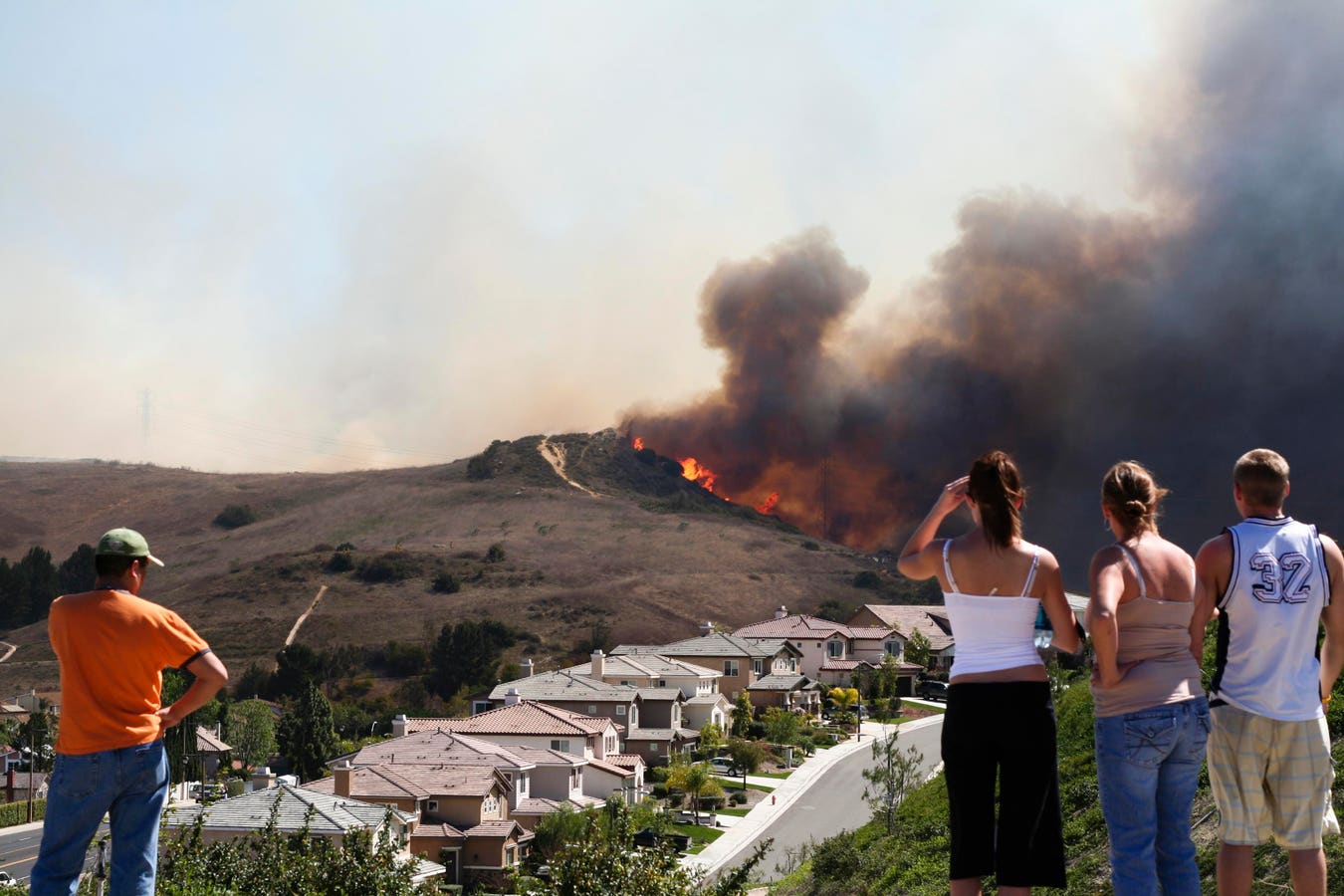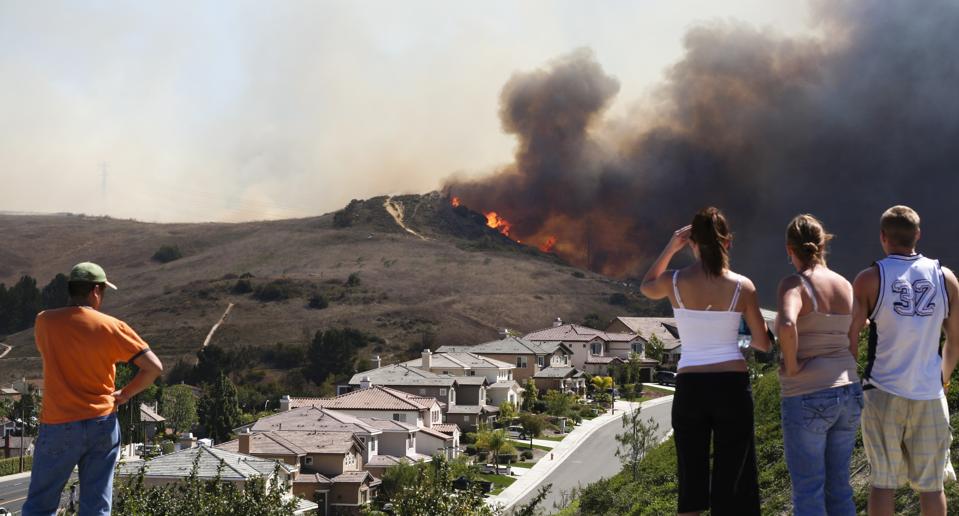A brush fire threatens a neighborhood.
From Washington to Utah and Florida, several state governors enacted laws this year to better prepare for wildfires and extreme weather to safeguard residents and even their pets amid a changing U.S. climate that is hotter, drier and more volatile.
“Wildfire activity is picking up nationwide,” reported the National Interagency Fire Center on June 24. “Several geographic areas in the U.S. are seeing hot, dry conditions and dry fuels, increasing the potential for new ignitions and large fire growth. Rapid response remains key to protecting lives, property and natural resources.” That day there were nearly 6,000 wildland firefighters and support personnel dealing with 29 large uncontained and 32 managed fires burning throughout the nation.
As of June 24, the center noted fires had burned over 1.64 million acres in the United States this year. The U.S. sustained 64,897 wildfires last year, up 15% from 2023. The number of acres burnt last year by wildfires jumped 231% to 8.92 acres from the 2.69 acres charred in 2023.
Wildland Fire Summary and Statistics Annual Report, 2024. (Large fires burn at least 100 acres in … More
“In 2024, the reported number of wildfires and acres burned nationwide was noticeably higher than the five and 10-year averages. Seven out of the 10 geographic areas saw above average numbers of wildfires and acres burned. The Southern Area had the highest number of wildfires, while the Northwest Area had the most acres burned,” stated the NICC “Wildland Fire Summary and Statistics Annual Report, 2024.” Wildfires last year destroyed 4,552 buildings (2,406 homes, 2,066 minor structures and 80 commercial/mixed residential buildings). Most buildings (32%) destroyed were in the Southwest.
Creating Fire Defense Zones around Homes in Colorado and New Mexico
Flames from the Palisades Fire burns a home during a powerful windstorm in the Pacific Palisades … More
In Colorado on March 31, Gov. Jared Polis signed House Bill 25-1009 in a vegetative fuel mitigation law. This new law enables a fire department to create a program to remove dead or dry plants that can catch fire on private property . The new law contains numerous details about requirements regarding notices to those who own or occupy the private property with the problematic vegetation. It also addresses compliance and fines for violations.
The legislation was introduced this year because Colorado has been experiencing long and severe wildfire seasons that present year-round threats to some communities. Removing problematic dry plant material is to create areas around homes where firefighters can more easily maintain defenses to protect property threatened by fire. The new law cited a Colorado State Forest Service guide to better protect homes from wildfires. It is called “The Home Ignition Zone”. The guide describes how people can create three rings around buildings to remove/reduce fire hazards such as vegetation that could fuel flames.
On April 10 the governor signed Senate Bill 25-015 requiring the state’s Wildfire Information Resource Center (under the Colorado Department of Public Safety) to include hyperlinks on its website that connect to other information resources. These hyperlinks are to provide public emergency information and wildfire updates for each the of the 64 counties in Colorado.
In neighboring New Mexico on April 7, Gov. Michelle Lujan Grisham enacted Senate Bill 33 called the “Wildfire Prepared Act.” The new law mandates that the state fire planning task force develops standards to create defensible zones around buildings to better withstand wildfires. The new law also supports technical assistance training and support for local governments to be better prepared for wildfires.
Melanie Kenderdine, state secretary of the Energy, Minerals and Natural Resources Department, issued a statement in March saying, “The 2,500-plus structures lost to wildfires between 2022 and 2024 alone underscore the need for this critical legislation. It will give homeowners resources to make their properties safer and maintain insurance coverage, while, at the same time, helping to protect our neighborhoods and communities.”
Utah to Improve Wildfire Emergency Response Coordination
Firefighters prepare to go and fight a wildfire in 2017 outside Panguitch, Utah.
Utah Gov. Spencer Cox issued an executive order in late April to create a wildfire management working group of state agency leaders to improve emergency response coordination with other government stakeholders. Among the group was to identify areas facing the highest risks for wildfires and provide mitigation recommendations.
“When it comes to wildfires, the unexpected has become the new normal,” Jamie Barnes, state forester and director of the forestry, fire and state lands division, noted then in a press statement. “Improving the effectiveness and efficiency of our planning efforts can help reduce risks to watersheds and landscapes across the state – and strengthen our overall wildfire preparedness.”
Florida and Washington Governors Sign Laws to Protect Pets
A volunteer takes care of pets in a makeshift shelter in a school in St. Augustine, Fla. before a … More
On July 27 a new Washington law takes effect to accommodate pets in shelters during an emergencies or extreme weather events. House Bill 1201 noted that one of the most pressing issues among people deciding whether or not to evacuate from their homes are being able to find emergency shelter for pets.
“Companion animal owners may refuse evacuation, attempt to reenter evacuated sites to rescue their companion animals, and experience grief, depression, and posttraumatic stress disorder due to separation from their companion animal during an emergency,” the bill stated. “The legislature further finds that gaps in public preparedness and cosheltering opportunities during a disaster or extreme weather event increase the risk to public health and safety.”
The bill noted state lawmakers created legislation to improve public preparedness by identifying shelters for pets in a disaster or during extreme weather. Washington residents shouldn’t have to choose between seeking safety elsewhere or staying with their pets at home in potential dangerous situations.
Washington Gov. Bob Ferguson signed the law April 21. It requires state jurisdictions to identify emergency emergency shelters that can take in pets. It also calls for agencies to have emergency preparedness plans that include shelters for companion animals.
The ASPCA (American Society for the Prevention of Cruelty to Animals) issued a media statement April 21 commending Ferguson and bill sponsor state Rep. Mari Leavitt (D) for the new law that takes effect July 1.
“Pets are family—and no one should have to leave theirs behind in a crisis,” said Rep. Leavitt. “This law makes sure our emergency planning reflects the reality that so many people rely on their pets for comfort, protection, and connection,” Leavitt declared in a statement after the bill was signed.
She noted the new law requires local emergency planners to identify shelters where people and pets can evacuate together include those shelters in official preparedness documents and publish that information online for people to be better prepared in emergencies.
The ASPCA stated that 80% of people who prematurely reenter an evacuation site are trying to rescue their pets. “Not only does this put the pet owners’ life in danger, but it also endangers first responders, who put their lives on the line to ensure the safety of the community. A lack of public preparedness, unclear state guidance, and low rate of pet-friendly emergency shelter facilities or co-shelters, where people can take and stay with or near their pets, all enhance these risks,” the ASPCA added.
In contrast with the Washington law, Florida took steps to punish those who abandoned their pets during natural disasters an extreme weather events.
Two men rescue a dog from floodwaters in North Carolina after a hurricane.
In Florida on May 28, Gov. Ron DeSantis enacted legislation to outlaw abandoning a person from abandoning or leaving a dog restrained/or tied up during natural disasters. The law informally was called “Trooper’s Law.” It provides criminal penalties for tying up a dog outside to abandon it during a natural disaster. The legislation arose from a situation last October during Hurricane Milton when a Florida Highway Patrol trooper discovered a dog surrounded by rising storm water and tied to a fence off of Interstate 75. The dog was rescued, named Trooper and taken to the Tallahassee Humane Society where it was adopted. Effective Oct. 1, anyone who restrains a dog outside during a natural disaster and thus abandons it commits a third-degree punishable according to state law or fined up to $10,000, or both.
“Across Florida, we have seen horrifying instances of animal cruelty that demand a stronger response,” DeSantis stated May 28 after signing the Senate Bill 150 and noting he was “proud” to enact Trooper’s Law that day. “Florida stands by man’s best friend.”
Lessons Learned in Oklahoma from Recent Wildfires
Oklahoma Gov. Kevin Stitt also ordered in late April the formation of the Wildfire
An aerial view of homes destroyed by Friday’s wildfire March 16, 2025 in Stillwater, Okla.
Response Working Group after wildfires that started March 14 spread swiftly through seven counties—killing 4 people, injuring 200 injured and destroying 515 homes and businesses. His request came after a preliminary report identified “critical failures and urgent areas for improvement in the state’s wildfire response,” the governor’s office noted. Among the issues raised were:
- Fragmented interagency communication during active fire,
- Emergency radios unable to operate between jurisdictions,
- Delays in sending resources to places in greatest need,
- Severe shortages of rural volunteer firefighters,
- Inadequate planning to handle high fire-risk conditions.
“Wildfires will come; we can’t always stop that. But we can control how we respond,” Stitt noted.









